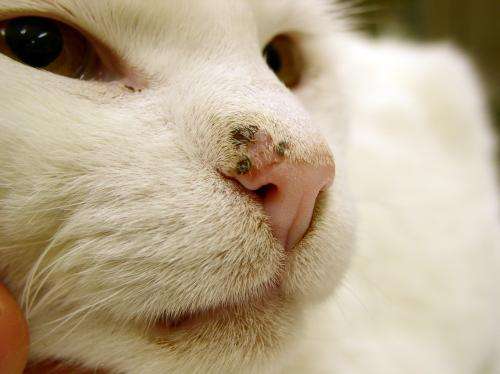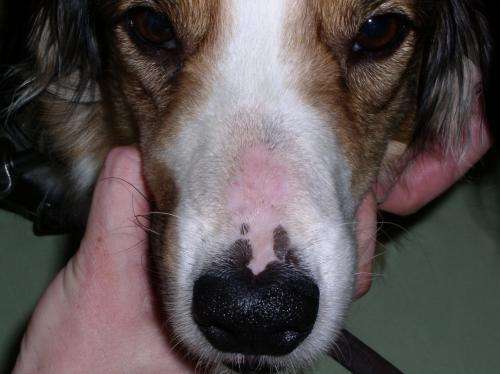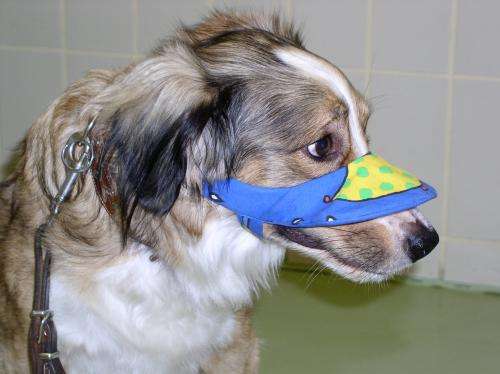Some dogs and cats prone to sunburn – How to protect your animal from skin damage

Excessive sunbathing damages the skin. Humans are not the only ones who need to monitor their exposure to UV rays: animals are at risk too. Dogs and cats with white or thin coats are at particular risk, as are animals with very closely shorn fur or with certain pre-existing conditions. Dermatologist Christa Horvath-Ungerböck from the University of Veterinary Medicine, Vienna explains which animals are particularly sensitive, how to prevent sun damage to the skin, and how to treat a sunburned animal.
Human or animals skin with little or no pigmentation is very sensitive to the sun in general. Hairless pets or pets with very short or thin fur can also be vulnerable. For dogs and cats this applies in particular to those parts of the skin that are regularly exposed to the sun. These include the ears, the bridge of the nose, the skin around the eyes, and the back. "Some animals particularly enjoy lying on their backs to bask in the sun. This exposes the skin on their bellies, which is often hairless, to the rays of the sun, increasing the risk of sunburn," reports veterinary dermatologist Christa Horvath-Ungerböck.
Particularly vulnerable pets
House pets with white or short fur are at particular risk of sunburn. The Dogo Argentino breed, white bulldogs, Dalmatians, boxers, whippets, beagles and white or multi-coloured cats with white patches have skin that is very sensitive to light, especially on their heads. In summer animals with shorn fur can also have a problem. The short hair allows UV rays penetrate down to the sensitive skin and cause sunburn.
Hairless dogs and cats are naturally more sensitive to the sun, since they lack the natural sun protection fur affords. Here too though, skin pigmentation plays a role, and darker animals are less vulnerable to UV rays. Owners of vulnerable breeds should take particular care to protect their animals from the sun.
Sun protection for animals

"As a rule, animals should have a shady place to lie in. Especially at midday, when the sun is at its strongest and presents the greatest risk, not just for the skin but for the animal overall", explains dermatologist Horvath-Ungerböck. Particularly sensitive animals require sun protection in the form of a waterproof sunscreen with an SPF of at least 30 or a sunblock containing zinc oxide, for example.
For longer hikes through the mountains where the sun's rays are particularly aggressive, sensitive animals should wear a t-shirt, coat or hat for protection.
The skin specialist advises owners not to worry: "Not every white dog or white cat needs sunscreen or clothing to protect it from the sun. If sun damage has already occurred though, or if an animal is highly sensitive, it is up to us to protect it from further damage."
Treating sunburn in animals
If sunburn is visible as reddened, warm or flaking skin, the animal should be moved to the shade as quickly as possible. Cool compresses and ointments to soothe the skin can help relieve the initial symptoms. If the burn is severe, a veterinarian should be consulted as treatment with a cortisone product may be indicated to prevent inflammation. If the skin changes present as a secondary infection, antibiotics may be indicated. The affected animal will need to be well protected from the sun in future to prevent permanent damage.

Certain pre-existing conditions can increase skin sensitivity
Some illnesses and genetic defects that result in a thin coat can make the skin more sensitive to sunburn. Any longer-term stimulus that results in a loss of fur is a possible factor. These can include parasitic infections, chronic skin conditions, or congenital hairlessness. In some cases, exposure to the sun can worsen an existing condition. Animals with autoimmune skin diseases must be carefully protected from the sun, for example. And areas of the skin that were covered by fur but are suddenly exposed due to hair loss, such as scar tissue after an operation or injury, should be carefully observed and shielded as needed.
Damage caused by sun exposure
In animals, sunburn results in an acute inflammation of the skin that can cause itching or even pain, depending on the individual animal. Frequent sunburns can lead to pre-cancerous conditions or even actual skin tumours. "We sometimes see squamous cell carcinoma on the heads of white, outdoor cats as the result of chronic sun exposure. The affected areas of the skin then need to be surgically removed," Horvath-Ungerböck explains.
Provided by University of Veterinary Medicine—Vienna


















